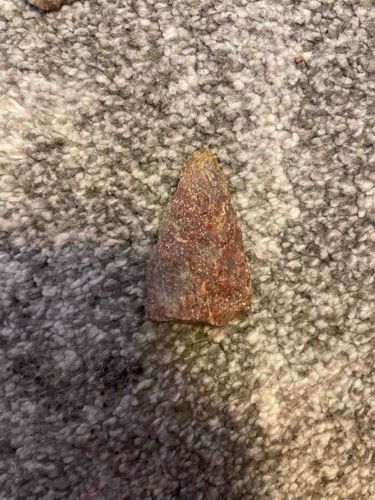
Reddish-Brown Mineral Fragment
The item appears to be a natural mineral specimen, likely a fragment of a larger rock or crystal formation. It is roughly triangular or conical in shape, suggesting a natural cleavage or fracture pattern, rather than a manufactured or worked object. The dominant color is a reddish-brown, indicative of iron oxides or other mineral impurities. Scattered throughout the reddish matrix are lighter, possibly white or clear, crystalline inclusions, giving the surface a speckled or granular appearance. The texture appears to be somewhat rough and unpolished, consistent with a natural stone that has not undergone significant human intervention like tumbling or shaping. There are no discernible markings, signatures, or obvious signs of manufacturing, leading to the conclusion that it is a natural piece. The edges are irregular, showing natural break lines. The visible condition suggests it is in its natural state, without signs of repair or significant damage beyond natural wear and erosion that would occur over time. The lack of distinct crystal facets might suggest it's a piece of aggregate rock or a less perfectly formed crystal. Without further geological testing, specific mineral identification is challenging, but its appearance is consistent with materials like granite, jasper, or a feldspar-rich rock.
AI-Generated Appraisal Disclaimer
Estimated Value
$1 - $5
Basic Information
Category
Mineral Specimen
Appraised On
March 1, 2026
Estimated Value
$1 - $5
Item Description
The item appears to be a natural mineral specimen, likely a fragment of a larger rock or crystal formation. It is roughly triangular or conical in shape, suggesting a natural cleavage or fracture pattern, rather than a manufactured or worked object. The dominant color is a reddish-brown, indicative of iron oxides or other mineral impurities. Scattered throughout the reddish matrix are lighter, possibly white or clear, crystalline inclusions, giving the surface a speckled or granular appearance. The texture appears to be somewhat rough and unpolished, consistent with a natural stone that has not undergone significant human intervention like tumbling or shaping. There are no discernible markings, signatures, or obvious signs of manufacturing, leading to the conclusion that it is a natural piece. The edges are irregular, showing natural break lines. The visible condition suggests it is in its natural state, without signs of repair or significant damage beyond natural wear and erosion that would occur over time. The lack of distinct crystal facets might suggest it's a piece of aggregate rock or a less perfectly formed crystal. Without further geological testing, specific mineral identification is challenging, but its appearance is consistent with materials like granite, jasper, or a feldspar-rich rock.
Get Your Items Appraised
Instant estimates of your treasures with AI-powered instant appraisals